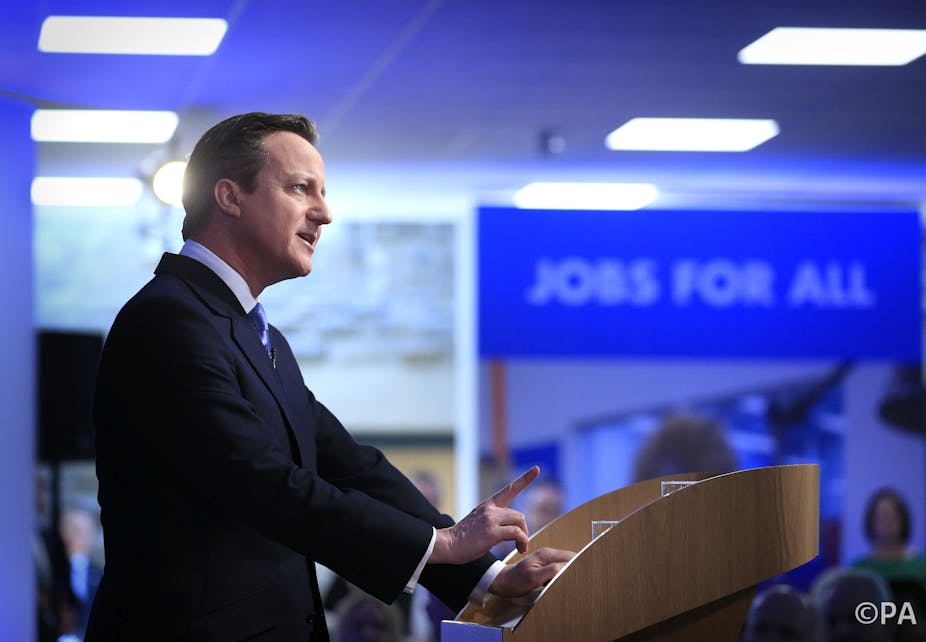Welcome to The Conversation’s Manifesto Check, where academics from across the UK subject each party’s manifesto to unbiased, expert scrutiny.
The Conservative Party manifesto contains several well-trailed proposals for further changes to the welfare system, alongside the continued roll-out of existing reforms. These include plans to freeze welfare payments (other than pensions and disability-related benefits) for two years from 2016; to cut the household benefits cap from £26,000 per year to £23,000 per year; to restrict access to benefits for migrants; to continue with the rollout of Universal Credit; and for people with disability to continue the switch from Incapacity Benefit to Employment and Support Allowance and from Disability Living Allowance to Personal Independence Payments.
The common theme here is reducing payment levels (albeit with some exceptions, most notably state pensions) and tightening the eligibility criteria for them. The Conservatives argue this will increase incentives for people to work and, via increased employment, reduce poverty.
On the first point they are likely to be right. Although these particular reforms are yet to be evaluated, there is a wealth of research evidence showing that reducing payment levels and tightening eligibility criteria for welfare benefits tends to move people off benefits often into some form of employment.
There is also evidence that tightening some benefit payments but not others tends to shift some people around the welfare system – think of squeezing a balloon – rather than into employment. The proposed Universal Credit reforms recognise this. The proposed benefit freezes for some working age payments but not others, however, does not.
The second claim – that tougher welfare will reduce poverty – is much more questionable, with less supportive research evidence. The rapid growth in food bank use, with benefit changes cited by many as the primary reason for their referral to a food bank, suggests recent reforms may be having the opposite effect, at least in the short term.
The £10 billion question
The biggest headline proposal, however, is to cut welfare expenditure by £12 billion per year over the next parliament. As the Institute for Fiscal Studies has pointed out, the specific proposals set out in the manifesto can be expected to contribute around £2 billion of this. We don’t know, and George Osborne has declined to say so far, where the other £10 billion will come from. This is around 10% of current annual working-age welfare spending.
The IFS has assessed some possibilities, but even freezing benefits for the whole parliament falls well short of the total required. The manifesto does point out, however, that the proposed £12 billion saving is considerably less than the £21 billion saved from the welfare budget over the course of the last parliament. On this front, however, the IFS estimate of this saving is £16.7 billion not £21 billion.
Hostage to economic fortune
Proposals like this are also hostages to the fortunes of the economy. Welfare expenditure tends to fall when economies grow and vice versa – it is counter-cyclical. And bar a few wobbles, the economy grew over the 2010-2015 parliament as it emerged, albeit slowly, from the Great Recession.
Looking forward to the next parliament, however, we cannot entirely rule out a further downturn, which would increase the pressure on welfare expenditure. Sticking to the £12 billion figure under such conditions would be difficult. Of course the economy could also grow faster than expected over the next parliament, with the opposite effect on welfare expenditure.
Longer-term demographic trends (population ageing) coupled with increases in the state pension age are also likely to increase pressure on working-age welfare spending. This is in part because the proportion of people receiving disability benefit increases rapidly with age.
The bottom line here is that the Conservatives have set out their desired direction of travel – reduced payment rates and tougher eligibility requirements leading to reduced expenditure on working age welfare – rather than a complete set of specific, costed proposals. Work incentives for the unemployed, people with disability, and single parents are likely to increase as a result. But so is the number of people using food banks.

